



IHSCM Regional HUB Magazine March 2023 Bringing our Regional HUB Network closer, sharing your stories and achievements. 1
3. Message from CEO Jon Wilks
4. West Midlands Intro
5. West Midlands - Orthotics: national award winners for sustainability
13.. West Midlands - The importance of leadership in the NHS: and the need to support our leaders
23. West Midlands - Career journeys in the NHS: a focus on our administration staff
35. West Midlands - The successful implementation of a new practice placement model for allied health students

47. West Midlands - Freedom of Information: the what, why, when, and how
54. West Midlands - Establishing apprenticeships for the Allied Health Professions
68. West Midlands - Using Computer Simulations to Guide Orthotic Prescriptions
77. South of England - High Cost Agency Spend - the Plane Crash of Workforce Management
Contents
76. South Of England Intro
82. London HUB Intro 83. South East Care HUB Intro Oxfordshire CA 84. South East Care HUB Intro Berkshire CA
East Midlands
North West HUB Intro
Wales Country
HEIW Intro
South East Care HUB Intro - Hampshire CA 90. West Midlands Care HUB Intro 91. West Midlands Education HUB Arden University Intro 92. London Education HUB University Wales Trinity Saint David 93. Northwest Care HUB - Lancashire and South Cumbria ICB 94. Education HUB intro GMTS 95. Military HUB intro RAFMS 96. West of England intro Care and Support West 97. East of England care HUB intro SAICP 98. East of England Care HUB intro Norfolk CA 99. South West Care HUB intro DISCA 100. London Care HUB intro Havering CA 101. IHSCM HUB Map 102. IHSCM HUB Map
The Loop Magazine 2
85. Primary Care HUB Intro Williams Medical Supplies 86.
HUB Intro 87.
88.
HUB
89.
103.
CEO Jon Wilks Message



3.
IHSCM West Midlands HUB is the Royal Wolverhampton NHS Trust and Walsall Healthcare NHS Trust. In this edition we have lots of input from this HUB and we thank you for sharing all of your great work. We currently have over 500 members and growing across our West Midlands HUB

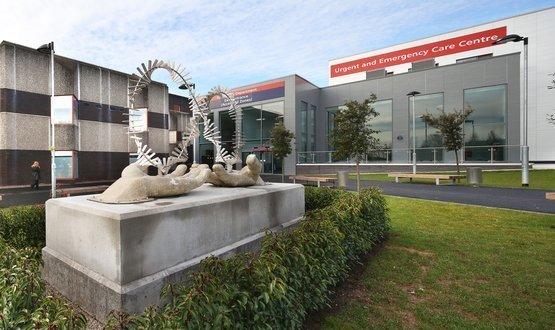




March 2023
4
Orthotics: national award winners for sustainability

Trust : RWT
Author: Kate Pugh and Ndanatsei Mupawaenda
The Royal Wolverhampton NHS Trust’s orthotics department based at New Cross Hospital and Cannock Chase Hospital was the winner of the sustainability award at the Fab Change Festival in 2021 and more recently they were announced as the Chief Allied Health Professions Officer (CAHPO) Greener AHP winners in 2022. The department achieved this by embarking on a sustainability drive, where the team investigated how to improve the sustainability of the service without negatively impacting quality, patient care, and efficiency. In April 2021 the “greener orthotics” panel was created to discuss ideas and formulate a plan, examining how to reduce waste, improve processes, and recycle and to see if there were ways patients could access the service differently.



JMarch 2023 5




March2023 6
The panel comprised: Beagle Orthopaedics- The main supplier to our orthotics service, Janet Smith (Head of Sustainability at The Royal Wolverhampton NHS Trust), Dr Nicky Eddison (Orthotics Service Manager and now the Trust’s AHP Research Lead), Kate Pugh (Orthotics Clerk now a Project Support Administrator at the British Association of Prosthetists and Orthotists), and Ndanatsei Mupawaenda (Orthotics Clerk).
Meetings were held monthly and led to:
1. The implementation of telehealth, and the reduction of single-use plastics and packaging.




2. The introduction of biodegradable bags.
3. A reduction in deliveries and the introduction of once-aweek delivery service.
4. The introduction of a large reusable box instead of cardboard boxes for collections and deliveries.
5. The introduction of an electric vehicle for collections and deliveries.
March 2023 7
6. The introduction of recycled paper, which was only used when necessary and the implementation of a service that printed and posted all letters externally on recycled paper. This was not only cost-effective but also gave the administrators more time to do other duties.
7. Triaging which was paper-based was changed to an electronic system along with electronic ward logs and goods posted out log.
8. Recycling bins were installed in the department.
9. AFOs were sent to developing countries to be used instead of disposed of.
The impact of those changes:

·151,913 miles of patient travel saved to and from the hospital. The equivalent of six times around the globe!



·A reduction of 5,621 car parking spaces
·A reduction of 28 tonnes of CO2emissions in the local area (It would take 14.7 hectares of forest a year to save 28 tonnes of CO2)
·0.1 Quality-adjusted life years saved
March 2023 8




9
The department consists of 12 staff, and it took a team effort to achieve our goals. The outcome of this project is a prime example of how small departments and small changes can have a huge impact. The NHS hopes to reach NET ZERO directly by 2040 and indirectly by 2045.




A personal perspective
As an Orthotic Clerk to be given the opportunity to be part of an award-winning project felt very empowering and fulfilling. To be given the chance to see an idea come to life, present it, and be supported to make changes that benefit both the department and meet the greener NHS objectives helped improve team working within the department and open a new platform for the team to be able to present ideas and be more open about changes they felt would improve efficiency. To see and hear one’s voice being listened to really was and still is life-changing both at work and in home life as now it is a little easier to step out of our comfort zones.
March 2023 10





March 2023 11
Kate Pugh and Ndanatsei Mupawaenda with the CAHPO award



March 2023 12
The importance of leadership in the NHS: and the need to support our leaders

 Trust:
Trust:
RWT
Author: Dr Nicky Eddison, Charlotte Colesby, and Russell Hanks
Numerous reports have found a large-scale failure of management and leadership in the NHS, often with serious consequences. Thus, the need for effective leadership in healthcare has come under increasing scrutiny with research emphasising the importance of high-quality leadership in ensuring positive, innovative, and caring cultures. Leadership has multiple interpretations, it is rarely defined and explicit references are vague and unclear.



March 2023 13
There are a plethora of opinions on what good leadership looks like and while there is much leadership training available, there is no standardised training for leaders in the NHS. There are many leadership theories, and each leader brings their own experience, skills, and personal characteristics alongside knowledge to their role. Where examples of excellent leadership are observed it is usually due to the endeavour of the individual as opposed to structured training and talent management. Although recent reports have offered recommendations to address this. The NHS has committed inordinate amounts of time and money in an attempt to change and re-structure. It was the Griffiths report in 1983 which was the catalyst for the introduction of general management in the NHS, accompanied by the famous quote “if Florence Nightingale were carrying her lamp through the corridors of the NHS today, she would most certainly be searching for the people in charge”.




March 2023 14
Following the Langsley reforms and the introduction of the Health and Social Care Act 2012 alongside the promise to “direct more money to the front line” and purge it of bureaucracy, a reduction in NHS management was targeted. Between 2010-2017 the number of NHS managers fell by 18%.


Today, the NHS still has only 2% of its staff in senior leadership positions, significantly below the national workforce average of 9.5%. This has led to claims it is one of the most undermanaged organisations on the planet, despite evidence highlighting the positive impact management and leadership has on performance in healthcare.



March 2023 15
It has been acknowledged that the allied health professions (AHPs) are in a prime position to effect change at every level of the NHS, with the encouragement to fill formal leadership positions alongside doctors and nurses. AHPs have demonstrated their capacity to rapidly transition from clinical positions to senior leadership roles. However, there is a dearth of exploration into the nature of these leadership journeys or how AHP leadership development and career progression might be supported. As a result, many AHPs may be ill-prepared for leadership positions.



The training and support a leader receives are vital because the role of a leader presents a range of challenges, often with no clear resolution. Leaders find themselves juggling an array of complex and wicked issues which they may not have faced previously. Thus, management is the equivalent of déjà vu (seen this before), whereas leadership is the equivalent of vu jàdé (never seen this before).

March 2023 16
This NHS is currently facing an enormous leadership challenge. The recent NHS staff survey highlights the level of stress present in the workforce with 46.8% of staff stating they have felt unwell as a result of work-related stress. As a result, there is an ever-increasing catalogue of instructions on what managers and leaders must do to help mitigate the huge issues the health and care sector faces and improve the health and well-being of staff (see figure 1). It appears very little thought is directed at supporting the leaders tasked with this monumental challenge. Consequently, leaders can often find themselves facing problems alone, believing the false narrative that a leader must be a panacea for all work-related issues and the old adage that ‘it’s lonely at the top’.





17
March 2023
Figure 1: Eight key workplace factors that will have an impact on the wellbeing

Support for AHP service managers



In an attempt to create a network of support for AHP service managers, in 2021 the authors of this article formed a support group. The AHP service management support group provides an opportunity for AHP service managers to meet on a regular (quarterly) basis, to discuss any issues they might be facing and have the opportunity to reach out to leaders in similar positions to share their experiences and discuss solutions.

March 2023 18
Specific aims of the group include:
To share ideas and solutions
To learn from each other
To share evaluation and outcomes

To discuss evidence-based practice and practice-based evidence to support decision making


To identify blockers and potential solutions
To provide peer supervision
To provide updates on courses and training available

To invite key stakeholders to deliver presentations
·To allow staff new in post access to experienced service leads

March 2023 19
An important element of the support group is peer supervision, which can be defined as “Supervision and consultation in individual or group format, for the purposes of professional development and support in practice…includes a critically reflective focus on the practitioner’s own practice”.
Peer supervision differs from clinical supervision in that it does not require the presence of a more experienced, qualified, or senior colleague. Research has shown that effective peer supervision can have benefits for both the organisation and the individual, including a reduction in stress and anxiety, an increase in job satisfaction, and staff retention. Furthermore, the Health and Care Professions Council (HCPC) with whom all AHPs must be registered in order to practice, support the case that registrants should be participating in supervision as part of their practice where possible18 and state in their standards of proficiency that registrants must “understand the importance of participation in training, supervision, and mentoring”.




March 2023 20
Peer supervision for members of the AHP service management support group is optional and occurs after the main meeting. It provides a confidential and supportive environment to share and discuss issues members are facing, providing the opportunity for feedback, reflection, and shared experience.



Staff who have attended the meetings have provided positive feedback

March 2023 21
If you are an AHP service lead at The Royal Wolverhampton NHS Trust or Walsall Healthcare NHS Trust and you would like more information about the AHP service management support group, please contact the authors of this article at: N.Eddison@nhs.net, charlotte.colesby1@nhs.net, and russell.hanks@nhs.net.
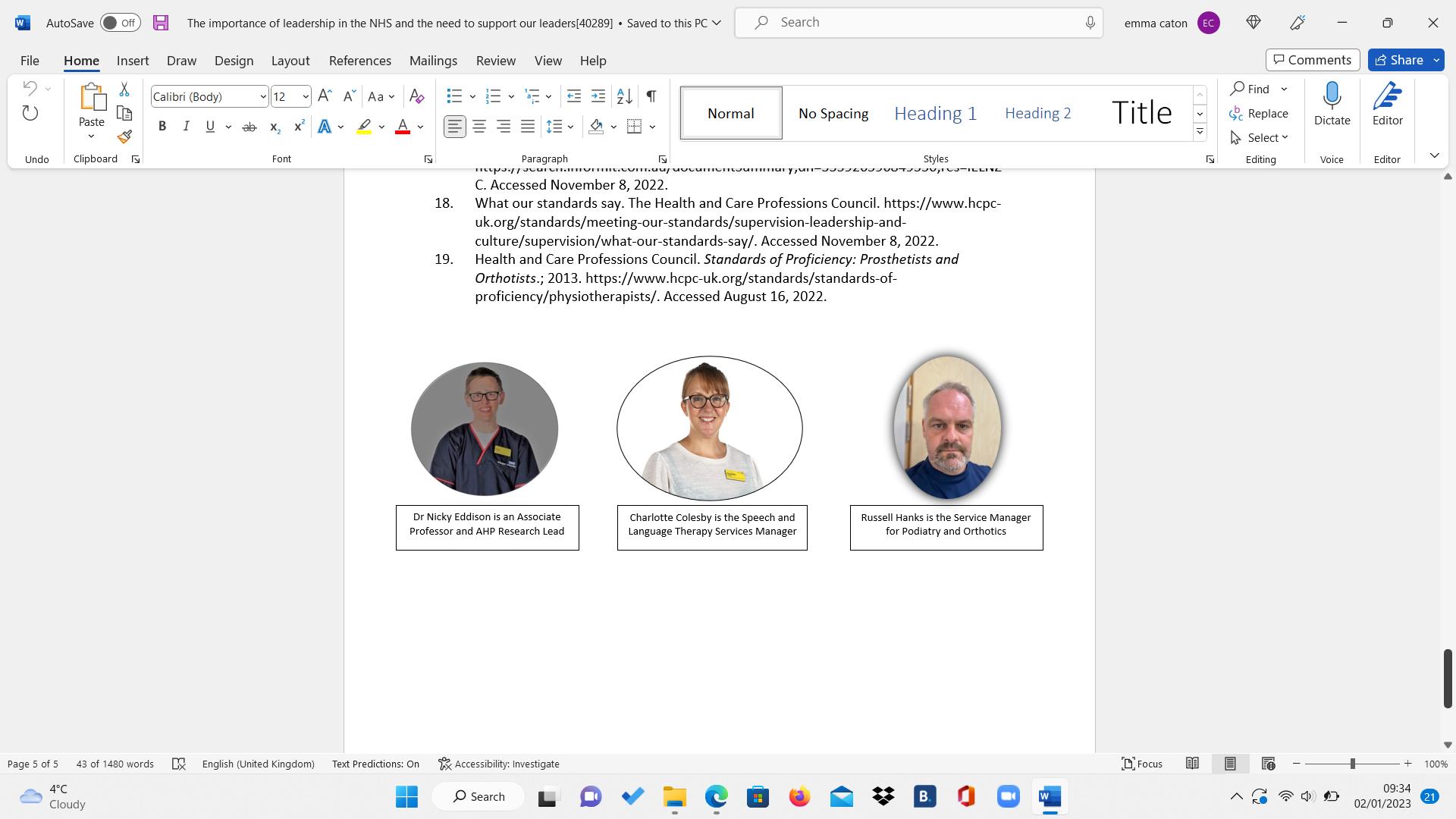



March 2023 22
Career journeys in the NHS: a focus on our administration staff




Trust : RWT
Author: Kate Pugh, Sharon Evans, Emma Wright, Gail Langston, Lisa Monaghan, and Dr Nicky Eddison
Almost a quarter (22.8%) of the 10,000 staff employed by the Royal Wolverhampton NHS Trust (RWT) are in administration and clerical roles. Administration roles within the NHS are fundamental in providing support to medical and non-medical services. Keeping accurate medical and staffing records, displaying excellent communication skills, and being the first port of call for patients, staff, and a variety of external partners. There are plenty of opportunities to take further qualifications and move on in your career. You could also choose to stay in an administration role and still progress, perhaps by becoming a team leader or supervisor.
March 2023 23
Progression and development are important for job satisfaction and staff retention. Providing staff with a feeling of being valued, recognised, and fulfilled. This article explores the careers of three individuals who began their NHS career journey at RWT at pay band two but went on to progress to senior leadership positions.




Emma Wright: Paediatric Emergency Department Sister
I have worked for RWT for 18 years. I started as a ward clerk, with duties including liaising with the multi-disciplinary team. This greatly improved my communication skills, and in turn, my confidence. Whilst undertaking this role I commenced a part-time NVQ course in children’s care. My manager supported me by allowing me to have flexible working hours. Following this, I secured a support worker role within the Trust's Health Visiting Service. I was given lots of training and support at the beginning, eventually enabling me to work independently, managing my diary and caseload of children. During this time, the Trust sponsored me to complete my paediatric nurse training. This was a huge opportunity for me. It was a career that I longed to follow but I felt unsure of my capabilities. Self-confidence is something I have always struggled with. However, my colleagues and my line manager encouraged me to take the opportunity.
March 2023 24
Using reflective practice, enabled me to see how I had progressed both professionally and personally over time. I was now able to independently assess a child’s development and needs, represent the service at various professional meetings, and manage my own time and workload to meet the needs of the service. I commenced my nurse training in 2012 and I have not looked back since. From qualifying in 2015, I secured a Sister's post in 2019. I now regularly clinically manage the area I work in. The Trust has provided me with several opportunities throughout my career, allowing me to progress. I would encourage anyone else to take these opportunities when they are available. I couldn’t imagine being where I am now, several years ago, but now, I would not want to be anywhere else.






March 2023 25
Gail Langston: Head of Patient Access
I joined RWT in November 1988 when it was known as the Wolverhampton Health Authority, so that’s 34 years this year. Like any young person starting, it was a scary, but exciting time. I didn’t know anyone or anything, but over time I gained knowledge and experience until I wasn’t scared anymore.



I started as a medical records clerk where I retrieved and filed patient case notes using a very old manual shelving unit, nothing like the state-of-the-art electronic units used these days. After a relatively short time, I had the appetite to do more and so I took every opportunity that came my way to learn new things and progress up the career ladder. I spent time working on maternity reception, the day case unit, appointments, and outpatient reception, all of which I loved. These roles allowed me to get to know the patients, especially in outpatients where I would see them regularly. The receptionist is usually the first face that a patient sees.

March 2023 26
I gained a promotion to a supervisor post where I was able to share the knowledge and support, I had been given with new colleagues joining the team. I then moved into managerial posts, still within the same field, but this role focused more on developing the processes rather than following them. My current role is Head of Service for Patient Access, a position I never dreamt I would be able to achieve, but I will be forever thankful and grateful for. It is more of a strategic role these days which I enjoy immensely, but I will always remember my days as a clerk and the support and opportunities I received which helped me to be where I am today.


I think the message I would give to our administration staff is that it doesn’t matter if you are a clerk or a head of a service, we are all here to do the best for our patients and all play a vital part to ensure the patient journey is the best it can be.



2023 27
March




March 2023 28
Lisa Monaghan- Head of Capital Planning
After starting my NHS career at the age of 21, as a band two health records clerk, I quickly “learned the ropes” and I was keen to progress up the ladder. I progressed to a team leader role in Health Records, whilst aspiring to a management role. However, I was unsure of which direction to go. Whilst fetching and carrying case notes wasn’t the most glamourous career choice, it gave me a solid understanding of the workings of the hospital, the different departments, and the variety of different job roles that exist across the NHS. As the case notes I had been looking for had been for surgical patients, I gained an interest in waiting lists and waiting list management. I chose to move into that area of work and excelled. I had so many ideas for making improvements, that I applied for a project manager post to make changes to the patient journey, and I was successful.





March 2023 29
I had gone from being the junior clerk to making improvements to the roles of hundreds of clerks, secretaries, and administration staff across the hospital. This opened my eyes to the opportunities to manage broader teams associated with the new change processes I had implemented as a project manager. Which led me to a more senior operational management role, including managing clinical services. The operational teams moved into new premises, and I started taking a keen interest in the planning and building of new facilities for patients, and this led me to my current role as Head of Capital Planning.


Whilst my career has been varied, I can honestly say the NHS has been incredibly rewarding, always having been a supportive employer, allowing me the development opportunities and confidence to change direction and progress in a way not many other organisations would have given me the ability to do.


2023 30
March
Training and development for or administration staff
The NHS is committed to supporting people to develop their skills and progress in their careers so they can help the NHS and health and care partners deliver high-quality care and improve population health outcomes2. RWT understands the importance of every role within the NHS offering development opportunities to all staff. The Trust provides various training programmes including leadership development, coaching, mentoring, and mediation along with apprenticeships and communication training. There are also fantastic opportunities for further education. The weekly Trust brief also has training opportunities included.



A framework for AHP support staff has recently been published. This framework sets out clear competency, education, and career development. To date, there has not been one produced for AHP administration staff. If a framework was in place it would show clear lines for progression, with a plan to recruit, educate, and train administration staff.

March 2023 31
There is a large number of staff who need representation, it would be good to see them supported by a framework. Administration staff play a crucial and growing role in delivering support across all services within the NHS, whether clinical or non-clinical. Ensuring clear and consistent access to high-quality learning and career progression for administration staff members will deliver benefits for all services within the NHS, such as high-quality patient records, improved staff retention, and improved staff morale. Defining clear pathways into and throughout an administration role not only increases job satisfaction and opportunities, but also builds workforce capacity, creates a more diverse workforce, and helps secure the future workforce.





March 2023 32
Claire Flatt, Lead for Nursing, Midwifery & AHP Leadership Development at RWT said:

“Leadership is not about role or title, but about our behaviour and actions and the impact and influence on the cultures, services and teams we are all part of. This is reflected in the new leadership development framework launching in 2023, which rightly focuses on a multidisciplinary approach to all leadership courses. Two of our newest courses for 2023 include Compassionate Leadership and Values Based leadership, and we hope to see staff from all corners of the Trust participating; there are lots we can learn from each other”.


If you are interested in progressing your career please seek the support of your line manager to discuss your plans. A good opportunity to review goals is at the annual appraisal where a development plan can be discussed in detail and implemented; although do not feel that you have to wait for your appraisal. Arranging a midpoint review meeting to review objectives is a suggestion.

March 2023 33




March 2023 34
The successful implementation of a new practice placement model for allied health students




Trust : RWT
Author : Dr Nicky Eddison and Lisa Smith
Student placement supervision is an action and process where a person (the supervisor) has been given responsibility for the support, training, learning, and developmentof a student to help ensure the individual meets the needs of the role.
There are a variety of placement supervision models available, Including the traditional 1:1 model, which is now seen as rigid and restrictive and provides the student with the perspective of only one clinician. The Dyad model which advocates a 2:1 approach (two students to one clinician) has the added benefit of increased placement capacity and permits peer learning between students, fostering a self-directed learning approach.
March 2023 35
The split placement models can be utilised by services lacking in staff or which have limited operating hours. In such cases, the student placement is shared with another service, which can be a different profession to widen the students’ experience.


The Collaborative learning in practice placement (CLiPP) incorporates a variety of learners in one learning area and aims to enhance the student placement experience by allowing for peer-to-peer support from other students in different year groups and across different professions. All care whilst on placement is overseen by a practice supervisor/assessor but it is the student who organises and delivers the care. The CLiPP learning model offers a very hands-on approach, giving students the most realistic experience; helping to boost confidence and increase leadership and clinical practice skills. It also has the potential to increase the number of student placements when compared to the more traditional models.


March 2023 36
The CLiPP model has been used successfully for nursing students at Walsall Healthcare Trust (WHT) but had not been trialled with the allied health professions (AHPs).




The CLiPP model for AHPs at Walsall Healthcare Trust
In 2021 I (Lisa Smith) was seconded to a Clinical Placement Expansion Programme (CPEP) role to increase student capacity for WHT for both occupational therapy and physiotherapy students. I worked alongside Amy Jowicz (CLiPP Project Support Officer), and Kate Cornforth (Practice education facilitator) and together we introduced the CLiPP model for our AHP students. Initially, there was some trepidation about the implementation of a new student placement model, with staff feeling unsure how the model would work in their areas. To ensure the placements were planned appropriately and would meet the needs of our students, a pilot was devised. This allowed staff to gain an understanding of how the placements would operate and get involved in the development of the programme.
March 2023 37




March 2023 38
Figure 1: The staff involved in the pilot of CLiPP at WHT
Three AHP-specific toolkits were developed to assist the students during their placements. Following a successful pilot, the new placement model was launched In November 2022, in collaboration with Wolverhampton University. The first cohort of students was a mix of occupational therapy students, physiotherapy students, and nursing students, all of whom were allocated to the Holly Bank Stroke Rehabilitation Unit.



39
Students on CLiPP are encouraged to take the lead in their practice, supporting their learning through identified daily learning outcomes with the aid of learning plans. The placements WHT were designed around ‘huddles’:
Huddle One
A list of jobs for the day was produced by the nurse, occupational therapist, or physiotherapist and then each student allocated themselves to complete each job to meet their goal.




Everyone went onto the unit and was hands-on from the start of the morning.
Huddle Two
All students and practice placement educators came together to reflect on their morning. This was a very positive time as students were eager to share what they had learned and were willing to discuss what they would do next time. All students were able to go through the GROW Model to reflect on their morning.
March 2023 40
Huddle Three
At the end of the day, students came together with practice placement educators and reflected on their afternoon.
Because the CLiPP model utilises the multi-disciplinary team (MDT) rather than a traditional uniprofessional approach, it enables the student to fully understand the whole of the patient’s journey rather than focusing on the treatment related to their speciality. Enabling our AHP students to learn alongside nursing students increased the students’ knowledge of medication and skin integrity. Exposure to the wider MDT provides students with a deeper understanding of different areas and roles in a ward, providing the students with a more realistic view of patient care and patient pathways.



An environment which enables students to work alongside other students across professions helps build confidence, through sharing knowledge, seeking advice and supporting one another when challenges arise1.

March 2023 41



March 2023 42
Staff feedback: Michelle Awale (Lead Occupational Therapist) and Laura Nock (Lead Physiotherapist)

As the lead therapists involved in implementing CLiPP on the Stroke Rehabilitation Unit at Hollybank House, we attended many planning meetings in the run-up to the launch to provide an excellent first CLiPP experience on the unit. Having previously only been used to one student to one educator placement model it did feel daunting to be having a 2:1 model, especially at a time of significant understaffing. The initial weeks of CLiPP felt very time and energy-consuming for us as educators and students. As the weeks progressed, through negotiation we began to find a structure of CLiPP that worked for our team. By the final week, we had a much-improved process which we plan to take forward to the next CLiPP placement. We do feel that CLiPP will work very well and enhance student experience when the team is wellstaffed with qualified therapists, as this would relieve pressure off the educators and enable them to focus on the placement model and the additional students that it entails. We look forward to the next placement, and to be able to see the comparison with the previous placement following the implementation of changes.



March 2023 43
Lessons learned
Our first CLiPP programme was a huge success and received excellent feedback from students and staff. However, we are still keen to keep improving. Our students told us they would benefit from a longer induction period. Both staff and students felt that an introduction and orientation to the unit and swipe cards issued before the start of their placement would be beneficial. In response to this feedback, we are considering introducing a preplacement visit.
Students also reported that they felt like they had been ‘thrown together’ without having the opportunity to get to know the other students. In response, we are planning to introduce an ‘icebreaker’ task to help the students get to know each other.
Going forward
We have planned a second cohort to run CLiPP at Holly Bank Stroke Rehabilitation Unit in April 2023. As a team, we are going to meet and plan a 6-week Practice Placement with the University of Wolverhampton.




March 2023 44
During the planning stage, we will use our evaluation to alter aspects of the CLiPP model from feedback provided in the first cohort to ensure that we make relevant changes to ensure the student receives a good experience. Furthermore,

I (Lisa Smith) will be working with Beth Lowe (Practice
Educator Facilitator) at WHT to implement CLiPP across other areas of the hospital and involve a wider scope of AHPs. I will be discussing and promoting our model of CLiPP in the Stroke Rehabilitation at WHT with other NHS Trusts who are also interested in using the CLiPP care and coaching model.
For more information about the CLiPP programme please contact Lisa Smith lisa.smith254@nhs.net




March 2023 45




46
Freedom of Information: the what, why, when, and how
Trust : RWT
Author: Laura Barr
I have to confess being largely unaware of the Freedom of Information Act, until last year when I found myself faced with a project intended to identify current practices in NHS Orthotic services across the UK. I won’t bore you with the project details here, but to provide some context – building a platform for best practice involves understanding the current clinical landscape. Wholesome blue sky thinking. But how do you actually get that information? I mean, short of door-stepping every NHS Trust and Health Board in the UK and hoping they will trade information for cupcakes. Did you know there are over 200 Trusts and Boards? That’s a lot of cupcakes.



Having been reliably informed that questionnaires may have a slightly disappointing return rate, regardless of the quality of your bribes incentives, I turned to the authors of prior publications and projects which had a similar scoping remit to my own. Enter the wonderful Dr Nicky Eddison, who introduced me to the UK Freedom of Information (FOI) Acts.

March 2023 47
What is the Freedom of Information Act?

The Freedom of Information Act 2000 and the Freedom of Information (Scotland) Act 2002, provide public access to the information held by public authorities, such as the NHS. Under these acts, public authorities within the UK are required to publish information about certain aspects of their activities and spending, and any member of the public is entitled to request certain types of information directly from that authority. The Act covers all pieces of information that are recorded and held by a public authority. This includes the usual things that may spring to mind such as official documents and policies, but it also includes recorded information such as emails, notes, document drafts and even CCTV and telephone recordings. While taking the time to ponder the implications of that, you might want to read some of the many news articles disclosing ministerial email communications, or perhaps the cost of the HCPC Christmas lunch.




March 2023 48
Why was the Act developed?
The purpose of the Act is to provide greater transparency and accountability of public services that can significantly impact the lives of UK residents and are partly funded by UK taxpayers. In the 1997 “White Paper”, the UK government discussed the development of the Act, explaining that"Openness is fundamental to the political health of a modern state. This White Paper marks a watershed in the relationship between the government and people of the United Kingdom. At last there is a government ready to trust the people with a legal right to information."


In evidence of this, the Information Commissioners office published findings in 2011 demonstrating that 81% of public bodies included in their survey agreed that the Act had increased public trust in their organisation. There are of course exemptions to the information that public authorities are required to provide. The Act itself is understandably complex in places and there is a degree of “grey area”, but fundamentally the main exemptions relate to requests for non-fact based information such as personal opinion, or information that would prove excessively time consuming or costly for the public authority to obtain.There are also limitations on information around personal data that may breach data protection.


March 2023 49






March 2023 50
When can information be requested from NHS services?




Any member of the public can request information via the Freedom of Information Act at any time, as long as this is done in the correct way and though the correct channels. FOI requests made to an NHS Trust or Health Board should be directed to the relevant Freedom of Information team within that area. This team will usually sit within the Information Governance department, the contact details for whom will be available on the Trust or Health Board website.
In order to comply with the Act, FOI requests must be written, must state clearly the information that is being sought, must contain a contact address or email address, and must contain the requestors real name. Requestors do not need to provide a reason for requesting the information.
The NHS Trust or Health Board has 20 days to reply to a Freedom of Information request, in order to comply with the Act. In some instances, they may request an extension depending on the particular circumstances surrounding the request.
March 2023 51
How does the Act affect Orthotic and Prosthetic services?

If you manage a NHS Orthotic or Prosthetic service, or you manage a company who provides Orthotic or Prosthetic services to the NHS, then you have likely been approached for information requested via the Freedom of Information Act at some stage. One of those requests was probably mine. That was the one with the cupcake. If you didn’t receive a cupcake, then it must have been stolen by the Information Governance team. Speaking of which… Requests should be routed to you from the relevant Information Governance team in your Trust or Health Board. The Information Governance team will generally screen the request for appropriateness and compliance with the Act before sending this to you, and they will provide guidance on the submission deadline for each request.




March 2023 52



53
Establishing apprenticeships for the Allied Health Professions




Trust : RWT
Author : Dr Nicky Eddison and Matthew Craven
Unlike traditional degree programmes, degree apprenticeships provide people with the opportunity to earn, gain work experience, and achieve nationally recognised qualifications. Research has shown that paid employment and no tuition fees were rated as the highest motivating factor by degree apprentices. Importantly, research shows that one-quarter of apprentices surveyed reported they would not have considered any other form of education or training had degree apprenticeships not been available1. Indicating that this mode of qualification is filling an unmet need. It also has the potential to increase the diversity in our workforce. The NHS offers degree-level apprenticeship routes into several NHS careers, through a mix of on-the-job training and classroom learning.
March 2023 54
Allied Health Professionals (AHPs) are the third largest clinical workforce in the NHS3. Degree-level apprenticeships as a route into the allied health professions have been available for over five years but have not been widely utilised by all NHS organisations. Prior to 2022, Walsall Healthcare NHS Trust (WHT) didn’t offer any AHP apprenticeships. Since then, the Trust has established apprenticeships in physiotherapy, occupational therapy (OT), and dietetics, intending to establish its first speech and language therapy apprenticeship later this year. The establishment of these apprenticeships took a combination of negotiation, influencing, luck, and a staunch belief that it was important for the future of our AHP services.
This article will explore the journey of developing the AHP apprenticeship offer at WHT, in the hope, it will be beneficial for other organisations who might wish to do the same.





2023 55
March
Establishing apprenticeships at Walsall Healthcare NHS Trust




At first, the development of apprenticeships at WHT was relatively straightforward, mainly because we either enrolled existing therapy support workers onto apprenticeships via an internal expression of interest process or we recruited external candidates as apprentices using vacant support worker positions. No acquisition of funding was required to create these posts other than the permission to access the tuition levy funding from the WHT apprenticeship team, and they were eager to oblige given our previous non-utilisation of the resource.

March 2023 56
. The next step was to liaise with the local university apprenticeship providers to agree on a recruitment process and timeline and become familiar with the academic entry requirements for the courses.




The academic prerequisites were circulated to all existing therapy support work staff at WHT with a request for expressions of interest to enrol on the apprenticeship programmes. For external apprentice recruitment, vacant band three therapy support worker positions were utilised by amending the job descriptions and person specifications to include the academic entry requirements and relevant information about the opportunity. The adverts were extremely popular and some needed to be closed early due to the volume of applications.
The interviews were conducted jointly with the universities. In most cases, we needed to interview over two days due to the volume of candidates. The successful candidates were then taken through WHT employment processes prior to university enrolment. As a result, we established four OT apprentices (two internal, two external) and five physiotherapy apprentices (two internal, three external).

57
Barriers
We encountered some barriers when we sought to expand our OT apprentice cohort as we didn’t have any support worker vacancies to convert or any remaining eligible/interested support workers to enrol on the programme. Expanding our OT apprenticeship was important for two reasons; we had already had great success with our first wave of recruits from the previous year who were proving very effective in their role, and we were facing incredible OT workforce supply issues, with a 60% vacancy rate for OT across the organisation. The expansion of OT apprenticeships was intended to be just one mechanism of stimulating the grassroots supply of OTs, to hopefully address our deficit in the medium to long term.



A meeting with the divisional director of operations and the divisional finance lead was arranged. The discussion focused on the reasons for creating additional unfunded apprenticeship positions.It was explained that our extensive vacancy position would provide a sufficient underspend to offset the creation of these new posts. The financial risk would be temporary as the OT apprenticeship course is only three years, following which, the staff will move into the vacant positions.

March 2023 58
Additionally, many of our recruited apprentices were existing support workers from neighbouring organisations, possessing extensive clinical experience and thus, would be able to offset some of the qualified OT workload which would otherwise require expensive agency staff. The financial risk was agreed upon, and we are currently in the process of recruiting four more OT apprentices.





March 2023 59
Establishing a dietetic apprenticeship provided similar barriers as we had no vacant positions to utilise, and the smaller dietetic service was fully staffed with no vacancy positions to leverage against the funding of any additional posts. Liaising with our workforce intelligence team was key. They provided a report on the dietetic turnover rate for the last five years. The data demonstrated that for any 12-month period, we could expect to have enough staff turnover to have a vacancy underspend that would fund one band three dietetic apprentice position. This data was key in getting approval to fund our dietetic apprenticeship.
Benefits
So why go through all this? The shortlisting process alone requires a significant investment of time. However, providing diverse educational routes into our allied health professions is essential to the sustainability of the workforce and its diversity. Ultimately leading to improved patient care.




60


March 2023 61
Challenges



The apprenticeship process is not without its challenges and for an apprentice to be successful they must have extensive mentorship and professional support in the workplace to apply their new knowledge and learn the trade4. In an established workforce this may not pose an issue, but in our circumstance, the OT workforce was significantly depleted, and asking the already stretched workforce to provide mentorship, was particularly difficult. To help address this issue we implemented several measures which have also had other benefits for the staff and services involved, including pooling senior OT resources and cross-supporting between services, utilising interdisciplinary support from experienced physiotherapists skilled in integrated working, and enabling apprentices to work alongside experienced assistant practitioner staff. Even with generous professional support in the workplace, a challenge for apprentices can be finding the balance between academic study and full-time work in the NHS. To help with this we try to be flexible with study time and last-minute annual leave where circumstances permit, to facilitate the meeting of academic deadlines.

March 2023 62
A final challenge to consider is that whilst our apprentices are with us at WHT they are bound by the limitations of autonomy set by their banding, whereas during their placement they can work up to completing tasks autonomously as they would as a higher band. Thus, when the apprentice arrives back from their placement, they can experience conflict between their assistant/apprentice role and the student therapist role. This dichotomy can lead to apprentice dissatisfaction5. To try and avoid this we are aiming to take our apprentices gradually through band four competency frameworks over the next 12 months so the disparity between their daily role and their role whilst on placement is reduced.


Feedback
The feedback from the first cohorts of AHP apprentices at WHT has been very positive!

March 2023 63


March 2023 64





March 2023 65
Conclusion
One of the primary barriers for managers is not knowing how to go about setting up an apprenticeship programme within their service. This article was intended to share experiences and guide others on how they can get started on their journeys in recruiting within this very valuable workforce.
WHT are fortunate to have divisional operations leads who are willing to take financial risks to help secure the future of our AHP workforce. Others may face more extensive financial scrutiny. It is always wise to make friends with your workforce intelligence officers and resourcing teams to help provide a compelling case for funding these opportunities without the laborious and lengthy business case process.
The benefits of apprenticeships far outweigh the risks or challenges. At WHT we now have a dynamic workforce who are providing great patient care and our organisation can take pride in the fact it has provided opportunities to a wide range of people, upholding NHS values of equality and inclusion, whilst helping to increase diversity in the AHP workforce on a wider scale than just our organisation.
*Matthew Craven led the implementation of the AHP apprenticeships at WHT. For further information please contact him at matthew.craven4@nhs.net




March 2023 66




March 2023 67
Using computer simulations to guide orthotic prescriptions
Trust : RWT
Author : Dr Nicky Eddison, Dr Panagiotis Chatzistergos, and Professor Nachiappan Chockalingam

The allied health professions in the United Kingdom are made up of 14 separate professions, of which prosthetics and orthotics are the smallest. Although small, orthotics has a beneficial impact on a range of clinical conditions and is vital to many clinical pathways. Many of which are policy priorities for the government and the National Health Service (NHS).




March 2023 68
1.5% of the world’s population needs a prosthesis/orthosis and it was predicted in 2002 that the number of people requiring orthoses would increase by at least 31% (7,382,876 people) by the year 20203. The most recent estimate suggested that there are 2 million orthotic users in England alone. A significant number of people in the UK rely on orthotic prescriptions to carry out their activities of daily living, remain independent, reduce their pain, and reduce the risk of symptom deterioration. Rigid Ankle foot orthoses (AFOs) are orthotic devices which are designed to control, prevent, and enhance the movement of the lower limb. An estimated 90,000 AFOs are prescribed to patients each year in the NHS5. The rigidity of the AFO is essential to achieving the desired clinical outcomes. It should only deform a small amount from the chosen alignment if it is to achieve the clinical goals. A lack of rigidity can result in pain (for example in an osteoarthritic ankle where movement is not desirable), it can also reduce the stretching and strengthening of the lower limb musculature whilst walking, which has the potential to impact the patient’s quality of life and increase the need for surgical and medical interventions to lengthen muscles in the lower limbs for patients with neurological conditions.




March 2023 69
Despite the ubiquity of these medical devices in healthcare, there is still a paucity of research on the most effective design to enable clinicians to achieve the desired clinical outcomes. Currently, there are no prescription guidelines which dictate how an AFO should be designed to ensure it is rigid enough to do the job it is designed to do. Prescription guidelines are still arbitrary and often based on experience or historical practice.
The lack of evidence-based guidelines for optimal AFO design results in poor treatment outcomes and poor patient experience7. It is also a cause of repeat prescriptions, which presents an additional cost to the NHS and delays patient treatment. This is often exacerbated by the long waiting lists in orthotic services nationally4. The ‘not right first-time’ issue of AFO fittings was a major cause of the NHS England national orthotic review which reported “The correct supply and fitting of orthoses can help improve quality of life by reducing pain, keeping people mobile and independent and preventing more invasive and expensive interventions like surgery, amputation, or the need for social care”2.




March 2023 70
Without essential data on the impact of each element of the AFO design, in terms of stiffness, it is not possible to devise prescription guidelines and standardise treatment and reduce disparities in treatment outcomes.





March 2023 71
Increasingly, computer simulations and artificial intelligence are taking a role in the clinical management of various conditions. Computer simulations can be used in the prescription of ankle-foot orthoses (AFOs) to help predict and optimise their performance for a particular patient. These simulations can be used to model a patient's gait and the mechanical properties of the AFO and can help orthotists and clinicians determine the best design and fit for the patient.



One approach to using computer simulations in AFO prescription is to use three-dimensional gait analysis, which involves recording a patient's gait using motion capture technology and then simulating the motion in a computer model. The simulated gait can be used to evaluate the biomechanical effects of different AFO designs and adjustments, such as changes in joint angles, muscle activation patterns, and ground reaction forces. Another approach is to use finite element analysis (FEA) to simulate the mechanical properties of AFOs and their effects on the patient's bones and muscles. This can be used to optimize the AFO design and materials, and to evaluate the potential risks of clinical complications.

March 2023 72
Whilst all these are theoretically possible to develop patientspecific interventions, an essential first step to change the overall system is to understand these variables and make use of them in a structured way to aid the prescription process. Our research team used a novel approach by combining mechanical testing of a rigid AFO with computer modelling (finite element analysis) to demonstrate the efficacy of different prescription designs.





March 2023 73
Based on this preliminary work, our research team has recently been awarded funding by Orthopaedic Research UK to continue this important research. Our work will impact all patients who are prescribed an AFO as part of their treatment. Patients will also benefit from a reduction of delays in treatment due to insufficient rigidity of the AFO structure at the fitting stage and improved clinical outcomes because of a more appropriate device. Clinicians will benefit from data-driven AFO prescription guidelines, turning a subjective process into an objective standardised process
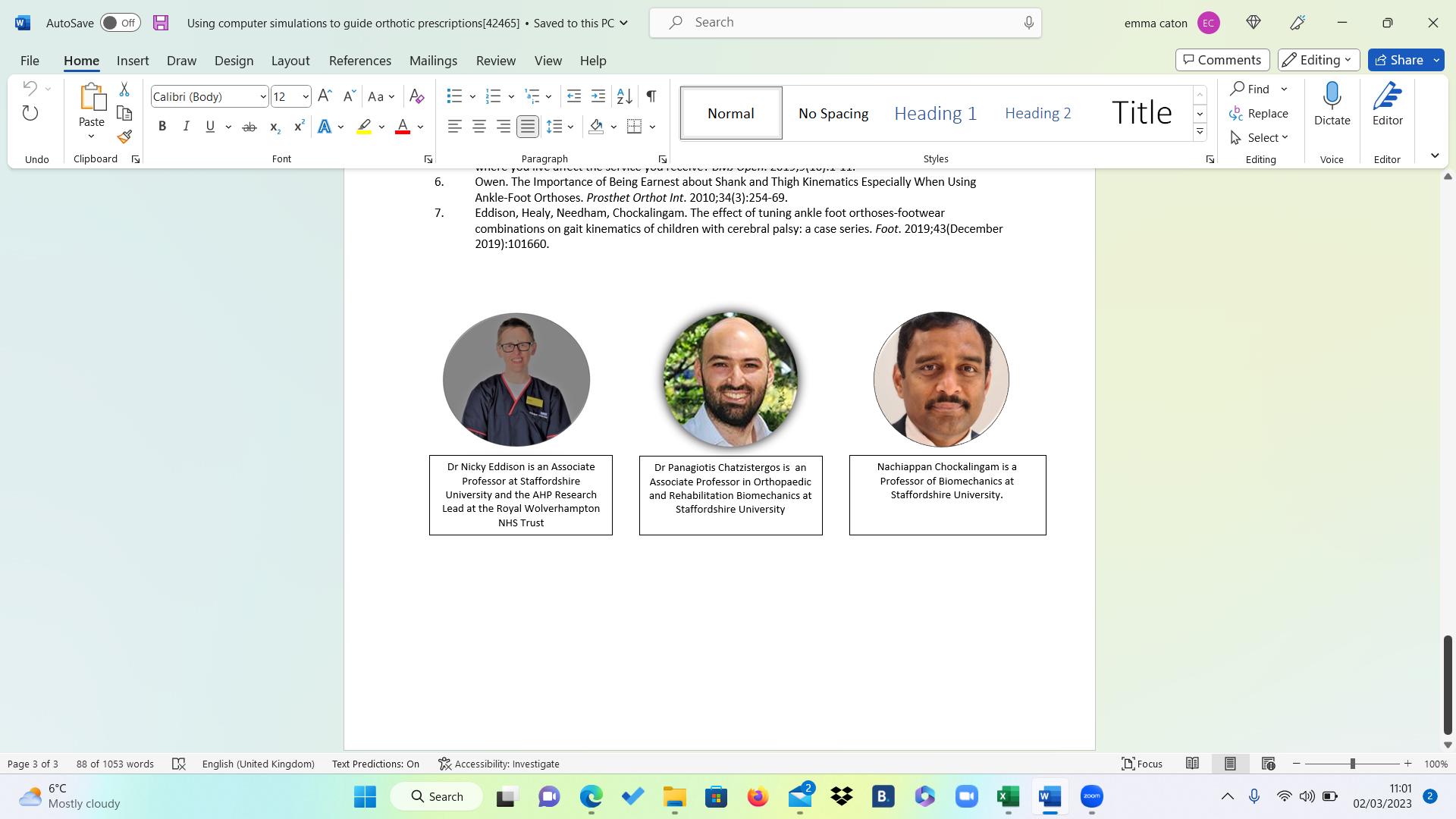


March 2023 74






March 2023 75
South, Central and West (SCW) is home to our South of England Regional Hub.
South, Central and West (SCW) is an NHS organisation providing support and transformation services to health and care systems. Our purpose is to support you to achieve the best possible outcomes for people, communities and populations.




We are a non-profit-making part of the NHS, with shared values and goals for healthier, happier lives. Any small surplus we make is reinvested back into the NHS for the greater good.
Our 1,500 dedicated staff cover a wide area across the south of England but we also work nationally, acting as system partners, joining the dots between health and care through service transformation and essential system support. With deep roots in the health and social care system, we have a clear perspective on both current and future challenges, and a passion for supporting our customers to address them. March

2023 76
High cost agency spend – the plane crash of workforce management?
 Author: Sarah Reed SCW HUB
Author: Sarah Reed SCW HUB
Delving into the intricacies of managing your workforce we look at how taking a holistic approach can help to reduce the need for agency support.



In the book ‘Outliers: the story of success’ Malcolm Gladwell talks about the misconceptions around the causes of plane crashes –that they generally are not due to one catastrophic fault, but due to a series of issues or failures that accumulate. A collection of failures, so to speak. Whenever I explore the issues of high agency spend, or of the use of high-cost agencies, this is the analogy I tend to pull.

March 2023 77
During my operational days within a provider, I took on the role of mobilising and managing a centralised bank. The work happened to coincide with the implementation of an e-rostering system, and it became quickly clear that the best way to reduce the volume and costs around temporary staffing was not going to be through the management of the bank itself, but instead would come from taking a more holistic approach, looking at the wider drivers, workforce management practices and cultures within an organisation. This can start with local practices around the use of agency frameworks and management of bank workers, working outwards to explore governance and ward level practices around rostering as well as organisational drivers and the impacts of local recruitment markets.
Taking this holistic transformation approach is not an easy or quick task, but it is one that is very worthwhile! It requires detailed insights into the drivers of why temporary staffing requirements exist, looking at every stage in the workforce lifecycle from national workforce shortages to the management of annual leave and rostering practices at a ward-by-ward level.




March 2023 78





March 2023 79
The transformation takes you on a journey through HR systems, management practices, cultural change, staff engagement and much more. It really gets to the heart of why the need for temporary staffing exists and how you can reduce the volume of requirements. In doing that, you can start to plug holes, reducing the eventual volume of requirements that are unfilled, making better use of your capacity across substantive staff, bank workers and framework agencies, reducing the likelihood of the need for high-cost agencies and reducing your overall agency spend.
If you’d like to know more about SCW’s high-cost agency spend reduction approach, please contact Sarah Reed, Associate Director for Workforce, EDI and Wellbeing, sarah.reed9@nhs.net





2023 80
March





March 2023 81
IHSCM London Hub is compromised of Guys and St.Thomas NHS Foundation Trust.


Royal Brompton and Harefield hospitals became part of Guy's and St Thomas' in February 2021, bringing together world-leading expertise and research in heart and lung disease.

We have over 500 IHSCM members from our London HUB.


March 2023
82
Oxfordshire Association of Care Providers



Our core existence is to support adult social care providers across Oxfordshire.


Currently we have Members covering more than 160 locations and we continue to develop links with many more with regular communications. We have annual contact with around 85% of registered providers in Oxfordshire and many non-registered services. We work with Oxfordshire County Council and alongside our sister care associations as part of the Berkshire Oxfordshire and Buckinghamshire Integrated Care System. We provide regular briefings for Members and the wider sector across the Thames Valley and we are part of the national Care Association Alliance.
Our strength is your engagement.
March 2023 83
Berkshire Care Association


We are the local and national voice for adult social care providers across the six unitary local authority areas in Berkshire


All Care Quality commission registered providers are members of Berkshire Care Association providers and we provide an enhanced service for Executive Members.
We work with six small unitary councils; three are part of the Berkshire Oxfordshire and Buckinghamshire Integrated Care System and three
March 2023 84
Williams Medical Supplies in Wales is our Primary Care HUB. We have worked with Williams for the past year and have helped to facilitate some of their great events. Williams Medical Supplies Ltd is a Wales-based manufacturer and retailer of medical products to the primary care and secondary care markets. It is the largest supplier to general practice in the United Kingdom with a portfolio of products ranging from surgical instruments to pharmaceuticals.
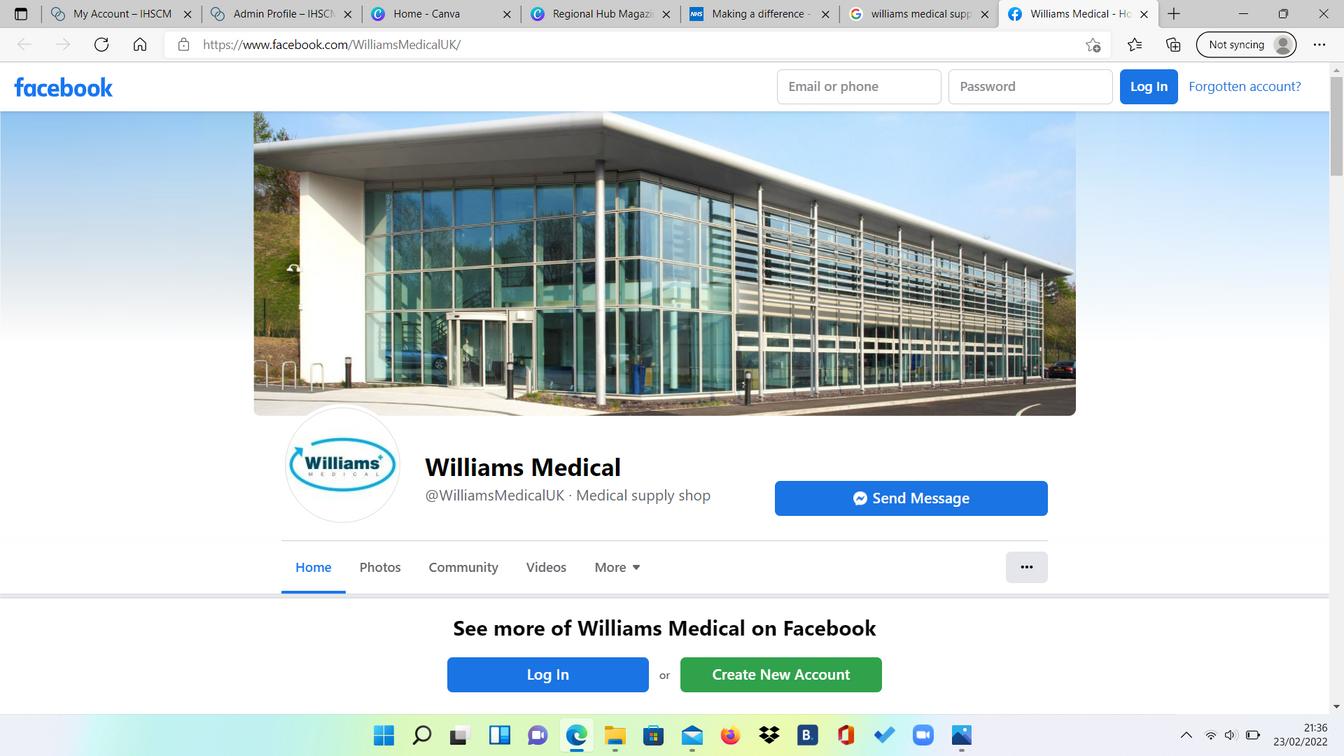



85
Northamptonshire Healthcare NHS Foundation Trust and the University Hospital of Leicester are the home of our East Midlands HUB. IHSCM Membership is growing for our newest Regional HUB. and we are looking forward to an eventful 2022!






March 2023
86
St Helens and Knowsley Teaching Hospitals make up the IHSCM North West Regional HUB. We currently have hundreds of members across this trust and have started planning some exciting in person events at this HUB for 2022! We look forward to hearing more about this trust in the next magazine edition.





March 2023
87
Health, Education and Improvement Wales makes up the IHSCM Wales Country HUB.




HEIW have a leading role in the education, training, development and shaping of the healthcare workforce in Wales. Ensuring we have the right staff, with the right skills, to deliver world-class healthcare to the people of Wales both now and in the future.
Established in 2018 as a Special Health Authority HEIW sit alongside health boards and trusts as part of NHS Wales.
March 2023
80
At Hampshire Care Association, the goal is to ensure that care provision in Hampshire is of the highest standard and quality and that those requiring care receive it with dignity and compassion.

HCA membership consists of care providers of Residential, Domiciliary, Nursing, Learning Difficulty and Mental Health homes.



HCA work with:
Hampshire County Council (HCC)
Portsmouth City Council (PCC)
Southampton City Council (SCC)
HCA also continue to negotiate passionately with all of the above for a Fair Price for Care.
March 2023
89
The West Midlands Care Association has been the voice of the care industry within the region for over twenty years. The Association offers the crucial support care providers require to deliver sustainable excellence within community, nursing, special needs and residential home settings.


The Association offers the crucial support Care providers require to deliver sustainable excellence within community, nursing, special needs and residential home settings.

Most services are delivered by the dedicated team at the Association office with support from our board members (Executive Team and Board Members)
A raft of far-ranging services enables members to spend more hours doing what they do best - care - while we carry out essential, timeconsuming tasks necessary for CQC compliance and business
March 2023 90
Arden has a proud heritage in flexible learning. We’ve grown and evolved from our beginnings in 1990 as the chosen online learning partner for universities across Britain, to offer a new kind of learning experience, providing both online and blended learning that meets the changing needs of modern life.

Today, we offer more than 70 degree courses, many of which are accredited by leading professional bodies such as the British Psychological Society, the Chartered Management Institute, the Chartered Institute of Marketing, the Agency for Public Health Education Accreditation, and more.


We strive to do things differently, and believe in doing things better. With study centres across the UK in Manchester, Birmingham, London, and Leeds, as well as in Berlin, Germany, we offer our students the chance to gain life-changing degree qualifications no matter their background or personal circumstances.

2023 91
March
Operational since March 2012, the London campus has become a key part of the UWTSD Group. Ideally located within the centre of one of the world’s most famous capitals, students are able to widely benefit from all that the city has to offer.

Studying at UWTSD London creates a unique experience combining the University’s nearly 200 years of academic learning with inspiring and innovative teaching and learning environment.

The London campus boasts a wide range of computing, business management, accounting, and health and social care courses. Featuring undergraduate courses such as BA (Hons) Business Management, BSc (Hons) Applied Computing as well as the Certificate of Higher Education: Skills for the Workplace and Skills for the Workplace (Health and Social Care) programmes.

March

2023 92
Lancashire and South Cumbria Integrated Care Board are home to our North West Care Hub.
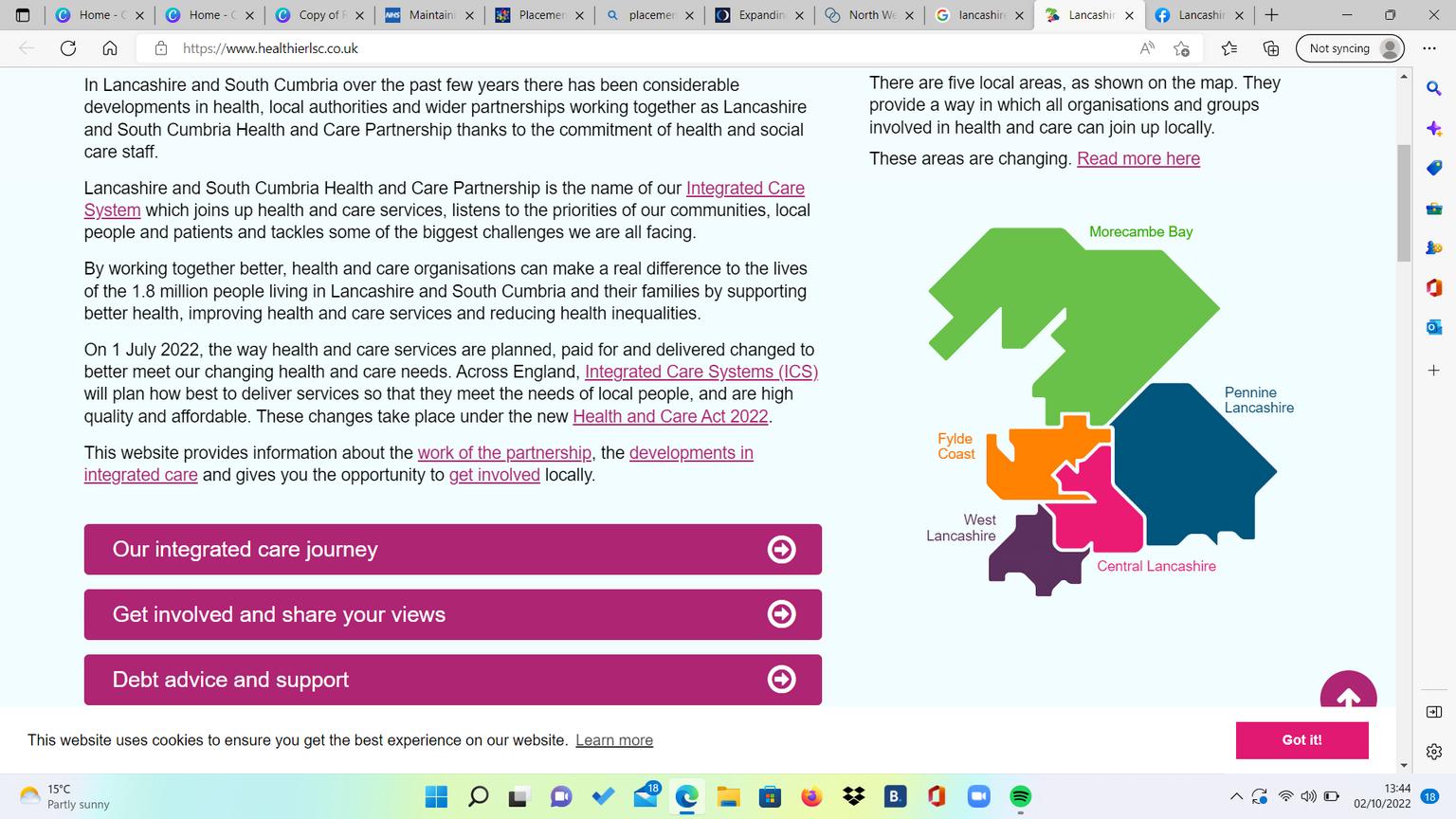

Lancashire and South Cumbria Integrated Care Board (ICB) are part of the Lancashire and South Cumbria Health and Care Partnership, covering four local authorities:

Lancashire CC
Blackpool CC
people’s health and wellbeing, and make sure everyone has the same
2023 93
March
The NHS Leadership Academy Graduate Management Training Scheme (GMTS) is home to our North East Education Hub.


The NHS Graduate Management Scheme (GMTS) is part of the NHS Leadership Academy since 2012, recruiting and developing NHS leaders with their multi award winning graduate training scheme.


March 2023
94
We are thrilled to have the Royal Air Force Medical Services as the home of our MIlitary Hub.


As part of Medical Services your primary mission is to ensure that personnel are medically fit to go where they are needed both in

March 2023 95
Care and Support West is a representative body for companies, charities, organisations, and individuals involved in social care, support, and health sectors in the West of England.

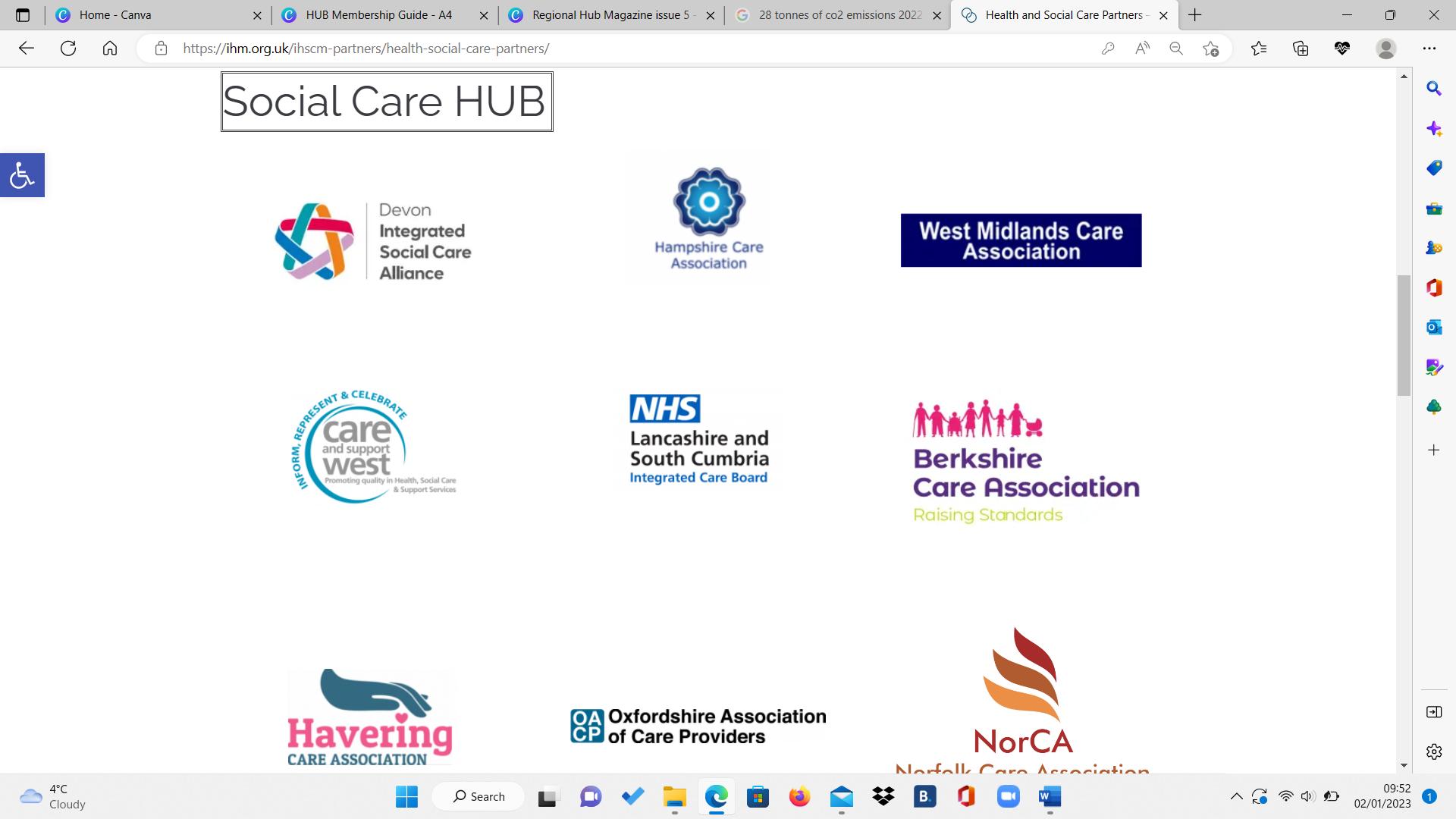
We give Care Providers a voice in the strategic direction of the


2023 96
March
·SAICP was founded in June 2006, by care providers themselves to create a self-help organisation who would work closely with other agencies and stakeholders responsible for care services in Suffolk. ·The Association is governed by a Steering Group (elected annually at the AGM) and a Board of Directors appointed when the Association converted to a not for profit limited company in 2011. ·Since inception, in conjunction with Adult Community Services at Suffolk County Council, the Joint Suffolk Care Partnership (JSCP) evolved which provides a platform from which any and all care related matters appertaining to the residents of Suffolk could be addressed.
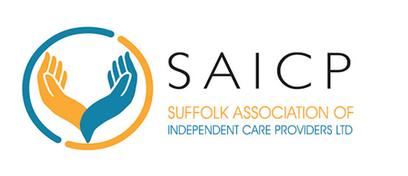
·SAICP act as a conduit between the local authority, SNEE and providers sharing information and leads on the annual fee negotiations for providers who accept local authority funded clients in need of care services.
SAICP aims to
· Ensure we provide opportunities to upskill individuals and teams in knowledge, skills and competency
·Offer support to owners and managers of care provisions to help resolve any problems they have.


·Provide support in auditing, coaching, training and Digital security.
·Provide opportunities for Providers and Managers to gain Peer to peer support through our Providers Support groups
March 2023 97
Norfolk Care Association (NorCA) is the voice of social care providers across Norfolk and Waveney. Membership is open to any provider operating in the Norfolk and Waveney area.




March 2023 98
We are delighted to call Devon Integrated Social Care Alliance our Care Hub for the South West. All staff working for Devon Integrated Social Care Alliance benefit from our Hub activity, providing locally accessible, convenient, regular and high quality workshops, programmes, meetings and social events, all geared to the development of you as a manager in social care.




March 2023 99
Havering Care Association are home to our London Care Hub.

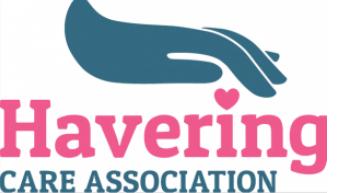
IHSCM hubs are designed to provide you with locally accessible, convenient, regular and high quality workshops, programmes, meetings and social events, all geared to the development of you as a manager in health and social care. The first workshops hubs undertake are the High Performance Leadership Online Workshops.


March 2023 100

87


March 2023 102
The Loop Magazine
We hope that you have enjoyed this edition of the IHSCM Regional HUB Magazine. We also produce a magazine that is accessible to all members quarterly. To view the latest edition and previous editions please click on the image below or here - Magazine – IHSCM (ihm.org.uk)



March 2023
103




IHSCM Regional HUB Magazine March 2023 Bringing our Regional HUB Network closer, sharing your stories and achievements.































































 Author: Sarah Reed SCW HUB
Author: Sarah Reed SCW HUB














































